Contents
- 1. Explore Sooke Potholes Provincial Park
- 2. Go for a Walk on Whiffin Spit
- 3. Hit the Hiking Trails
- 4. Enjoy the Views or Paddleboard on the Sooke Basin
- 5. Ride the Bike Trails
- 6. Enjoy Dining in Sooke
- 7. Tour the Sooke Region Museum
- 8. Visit the Sheringham Point Lighthouse
- 9. Buy Fish Direct from the Fishermen
- 10. Soak Up the Views at French Beach Provincial Park
- 11. Catch the Big One on a Deep Sea Fishing Trip
- 12. Go Whale Watching
- 13. Visit the Old-Growth Trees in Port Renfrew
- Map of Things to Do in Sooke, BC
Authors Michael and Lana Law spent a winter living in Sooke. It’s one of their favorite destinations on Vancouver Island.
This small town just 40 minutes from downtown Victoria is worlds away from the hustle and bustle of the city. Set just back from the Strait of Juan de Fuca, the town has a laid-back feeling, with some small shops, food trucks, great restaurants, and coastal attractions.
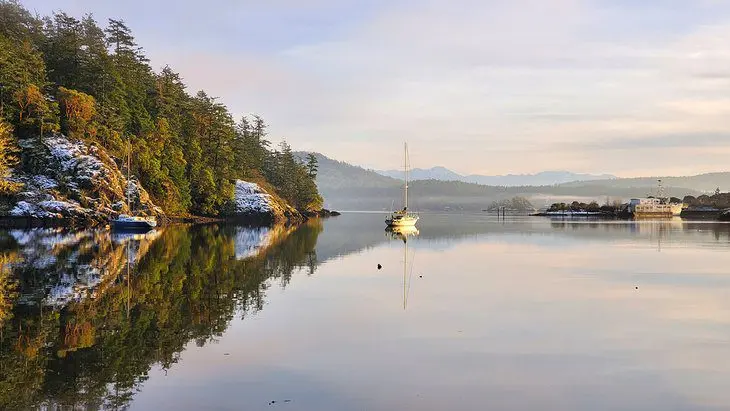
Things to do here revolve primarily around the outdoors. Whale watching, deep sea fishing, mountain biking in the Sea to Sea Regional Park, swimming at the local river, and long strolls along the Galloping Goose Regional Trail round out the activities. Nearby attractions include long walks on lonely Pacific beaches, a lighthouse, and surfing at Jordan River.
Discover the best places to visit in one of the best small towns on Vancouver Island with our list of things to do in Sooke.
1. Explore Sooke Potholes Provincial Park
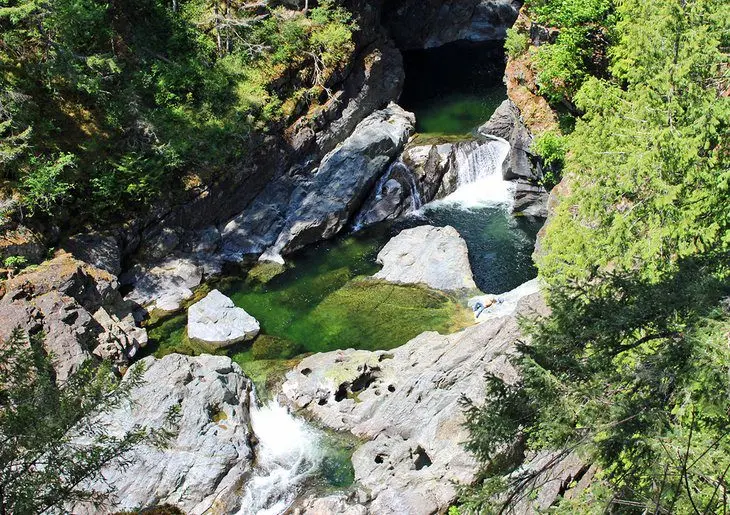
If you mention the name Sooke to someone from out of town, the first response you will usually hear is “Sooke Potholes.” This provincial park is the town’s most famous attraction.
Encompassing the Sooke River as it descends from the highlands, Sooke Potholes Park is one of the most unique provincial parks on Vancouver Island. The most interesting part of the park is at the base of a large waterfall, where deep potholes have formed from millennia of erosion.
In the summer, the waterfall is just a trickle, and the water in the potholes makes an ideal spot for a swim. People come here to lounge on the dry rocks in the sun and dip in the water to keep cool.
Follow the trails down to the water’s edge, clamber over some rocks, and jump in. Lay out on the sun-heated smooth rocks after your dip to warm up. Upstream from the potholes are two sandy beaches if you prefer easier access. In the winter during the rainy season, the river squeezes through this chasm and roars over the same area.
The entire area is covered with large trees and ferns. The Galloping Goose Regional Trail, a former rail line, traverses the park, and several access points are available. It’s worth walking the trail toward the impressive and recently rebuilt Todd Creek Trestle.
2. Go for a Walk on Whiffin Spit
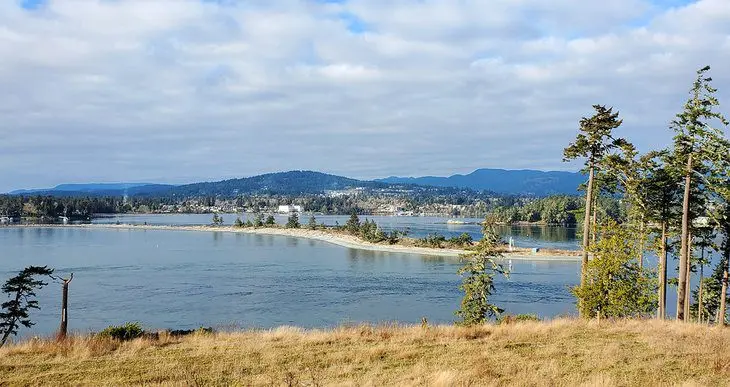
The easiest way to enjoy the ocean when visiting Sooke is to walk out along Whiffin Spit. This long stretch of sand is a natural breakwater that extends just over a kilometer into the bay. A mostly level graveled walking trail runs the entire distance, and a walk to the end and back clocks in at just over 2.5 kilometers.
A favorite with dog walkers, joggers, and birders, this is one of the best trails in Sooke. On a sunny day, the Olympic Mountains in Washington State can be seen off in the distance. Good views back towards Sooke Basin and the town itself are seen on the return trip.
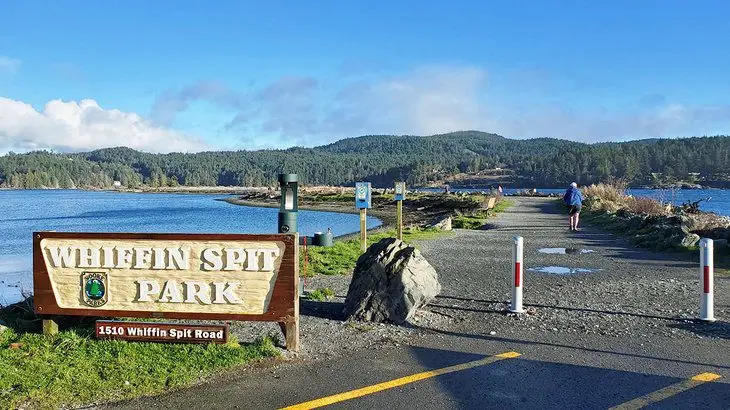
Check the tides prior to your visit. Wiffin Spit is especially interesting at low tide, when the large beaches facing the Juan de Fuca Strait emerge and make for additional walking areas.
Birders take note that all kinds of avian wildlife make the Wiffin Spit area their home, or a stop while migrating.
3. Hit the Hiking Trails
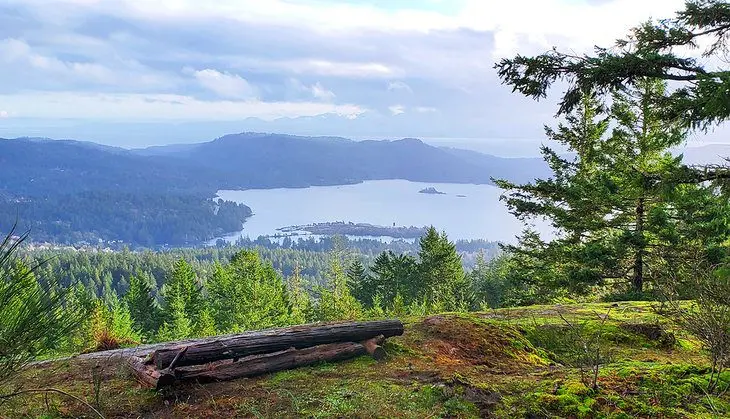
One of the best places to go hiking near Sooke is at the Sea to Sea Regional Park. An extensive selection of hiking and mountain biking trails weave their way through towering trees, while burbling brooks splash nearby.
The hiking trails are well marked, and the level of difficulty ranges from wide-open former logging roads right through to wet, rocky slogs uphill. Trails lead to two mountains in the park: Mount Brule and Mount Manuel Quimper. On a clear day, you can see out over the Sooke Basin across the Juan de Fuca Straight to the snowcapped Olympic Mountains.
The hike up Mt. Brule is a bit easier than Quimper. This six-kilometer round-trip hike rises just over 300 meters and follows a wide roadway for roughly 3.5 kilometers and a steep stony trail for 1.5 kilometers.
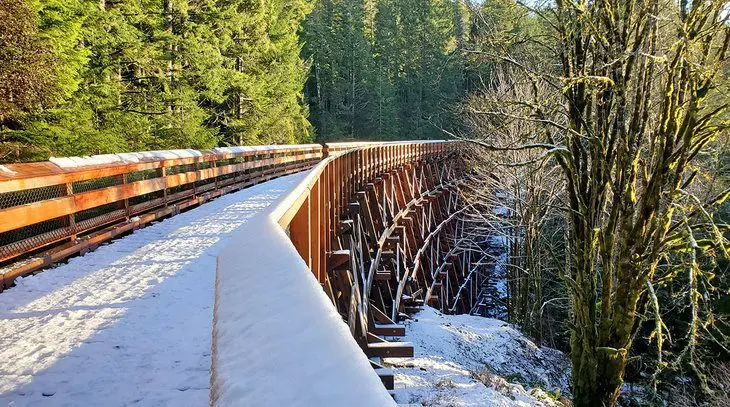
Access to the above-mentioned trails is from Harbourview Road in Saseenos, just south of Sooke. Here, you’ll find a large parking area, detailed maps, washrooms, and a bike-washing station.
More great hiking trails can be found in East Sooke, including one of the best trails near Victoria: the Coastal Trail. This hike does not involve any great elevation as it follows the ocean. This trail is a one-way, 10-kilometer hike, but you can opt to do just a portion and start at either end.
For lighter hiking, hop on the Galloping Goose Trail. Particularly beautiful sections can be found near Sooke Potholes, both in the park and nearby. Trestle bridges along the route, including the Todd Creek Trestle, offer scenic points along the way.
4. Enjoy the Views or Paddleboard on the Sooke Basin
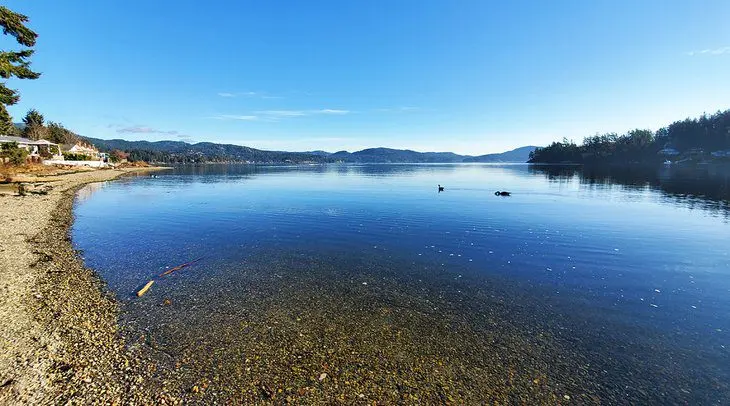
The Sooke Basin is one of the most scenic spots in Sooke. The basin is protected on three sides by hills, with just a narrow entrance from the ocean, and as a result, it is generally calm. People come here to walk along trails, like the Galloping Goose, or enjoy the views from Billings Spit at low tide. This is also a great place to visit to see ducks, geese, and other waterfowl.
Sooke Basin is an ideal place to get out on the ocean, either on a stand up paddleboard or small boat. It’s a wonderful alternative to heading out on the open ocean. Be sure to watch the tides if you are going out on the water.
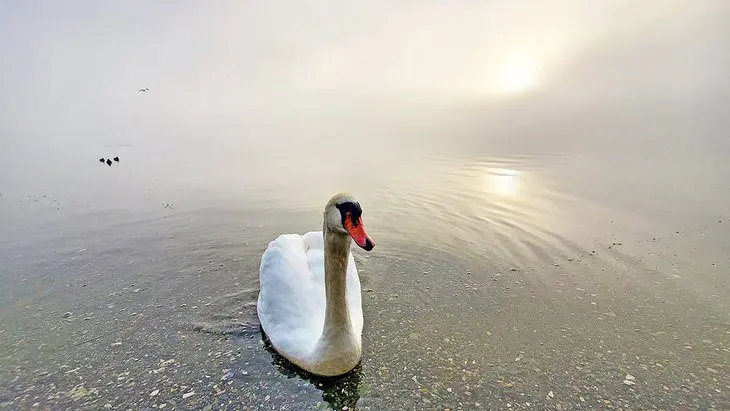
One area of note in the basin is Anderson Cove. The entrance to Anderson Cove is narrow and makes for an interesting place to paddle through. You’ll usually find a small fleet of sailboats anchored here sheltering from the wind and waves of the larger Sooke Basin.
Boat access is primarily through beautiful Anderson Cove, a smaller bay off the larger Sooke Basin. If you want to walk, you can park at Roche Cove and stroll along the Galloping Goose for views across the basin.
5. Ride the Bike Trails
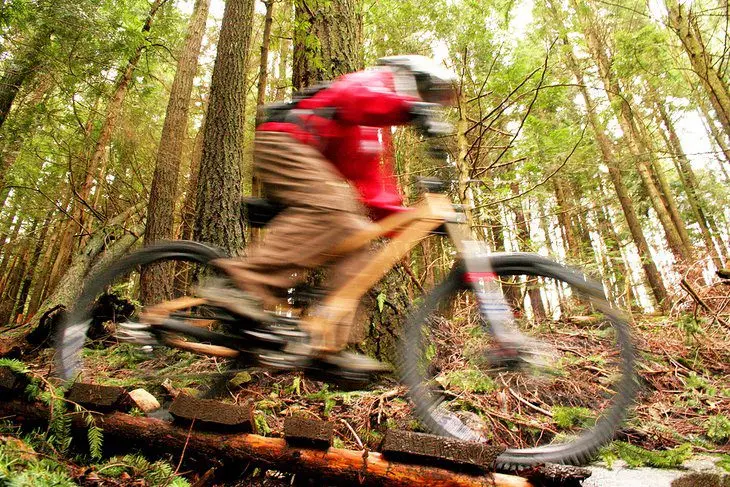
Biking in and around Sooke is excellent. You’ll have your choice of heart-pounding mountain biking ascents leading to screamingly fast descents down wicked trails or more sedate cruising along mostly level former rail lines. Biking in Sooke is primarily on trails in the forest. Road biking along Highway 14 is not recommended, as it is narrow, busy with car and logging trucks, twisty, and hilly.
Mountain bikers will want to head to the Sea to Sea Regional Park for an amazing array of trails winding their way through the forest. Routes are graded according to the difficulty level, and when the trail says black diamond, it is truly for experts only. The main access road for all the trails is a long slog almost straight up, with few areas to catch your breath.
At Sea to Sea, you truly “earn your turns”! Be prepared for a tough start to your biking day. However, all that effort is lavishly rewarded by uncrowded trails that challenge and excite at the same time. At the base area, you’ll find a bike-washing station and washrooms. This is also where you can find the trail map.
Biking enthusiasts or families looking for something easier should try a ride along the Galloping Goose Trail. This former railway gently winds its way through the forest with an easy upward grade.
One of the most scenic sections is the portion from the parking lot approximately two kilometers up Sooke River Road on the right side up to the lookout area at Sooke Potholes Provincial Park. Along the way, you’ll pass over two very impressive wooden trestle bridges and through areas of enormous trees.
6. Enjoy Dining in Sooke
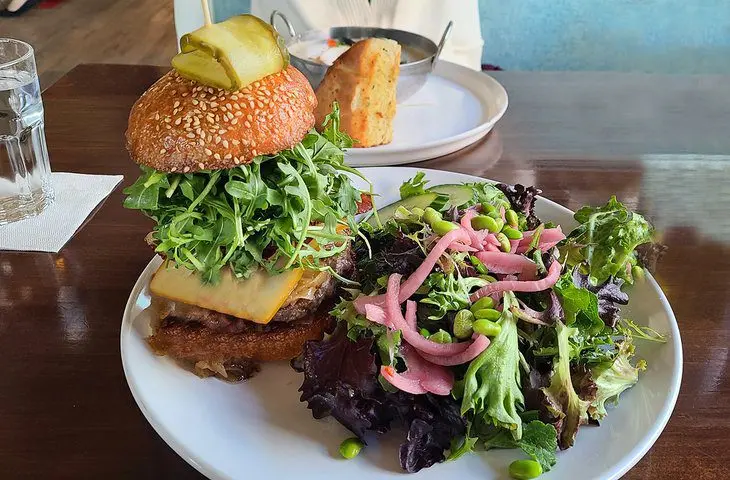
For a town with a population of 13,000 (and growing), Sooke is well-supplied with amazing places to eat. Food Trucks, waterfront restaurants, in-town establishments with sunny patios, and fine-dining options for a romantic dinner will make your dining decision harder than you might think.
The city doesn’t have a set area for food trucks per se; the trucks are spread around the city in various locations, and a bit of driving around is necessary to find them. A couple of key spots to look include just past the Sooke River bridge on the left side by the building that looks like a castle, the parking lot on the waterside of Highway 14 near the town’s only roundabout, and, finally, about 500 meters up Otter Point Road on the right-hand side.
For true waterfront dining both indoors and on a wonderful outdoor patio, West Coast Grill is hard to beat. Big views out to Sooke Basin and to the Olympic Mountains combined with innovative and tasty fare will have you coming back time and again.
On the highway in the heart of Sooke, and across the street from the CIBC bank, is Route 14. The restaurant has a patio out front, with picnic tables and a cozy interior space. Menu options are innovative and tasty, check out the daily feature.
Although not technically in Sooke, Mile 17 is an institution that is well worth a visit. This historical restaurant has a history dating back to 1894, the name comes from the fact that it is 17 miles from Victoria City Hall.
7. Tour the Sooke Region Museum
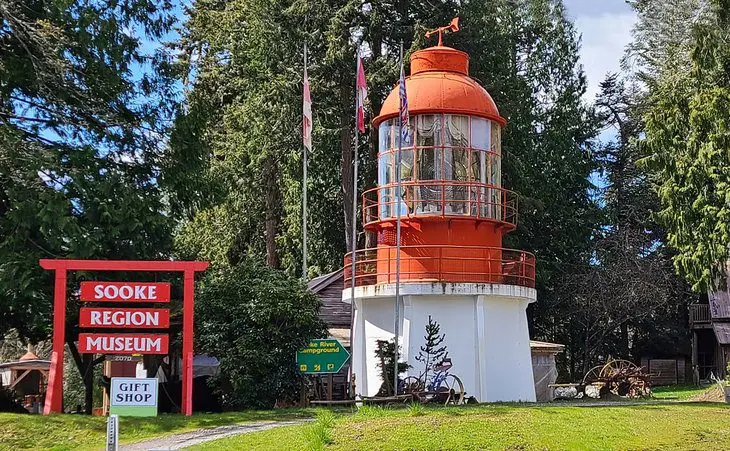
A quick trip to the Sooke Region Museum will bring you right up to speed on the history of this vibrant small town. The museum has a variety of interesting displays chronicling the development of the town through the years.
One of the highlights of a visit is the wonderfully restored Triangle Island Lighthouse dating from 1910. The bulb in this lighthouse illuminated a beam that could be seen from over 80 kilometers away.
A short stroll away is the 1928 steam locomotive used in the building of a nearby dam. The Moss Cottage is a must-see exhibit as well, it’s the oldest pioneer home west of Victoria and dates from 1870.
8. Visit the Sheringham Point Lighthouse
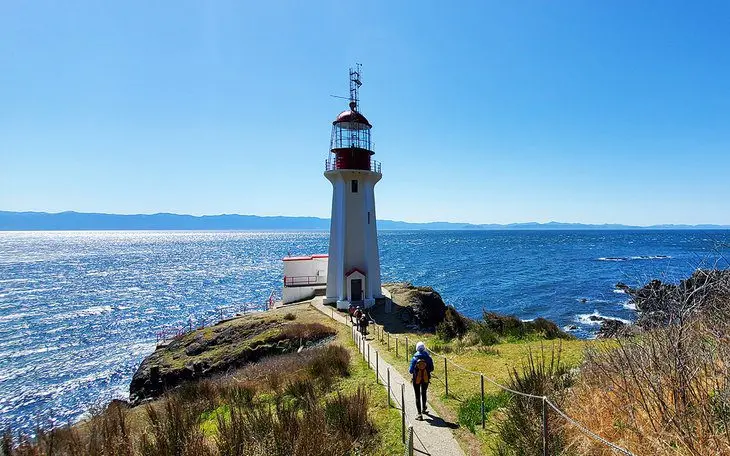
A short drive along scenic Highway 14 towards Port Renfrew will take you past the turnoff to historic Sheringham Point Lighthouse. First operational in 1912, the lighthouse finally saw its last keeper depart 77 years later in 1989.
Now preserved as a historical site, Sheringham Point Lighthouse sits on a rocky promontory and provides expansive views out across the Juan de Fuca Strait to the Olympic Mountains in Washington state.
Access to the lighthouse is easy: turn off Highway 14 in the small town of Shirley and follow the narrow road and signs down to the parking lot. Here, a short trail will take you down across a paved road and to the entrance to the site. Enter and continue down the hill passing informational plaques along the way.
After visiting the lighthouse, you can retrace your steps back to the parking lot or, for a short hike, turn left at the paved road and walk a short way to the spot where the trail loops up through large trees. This will take you on a 2.9-kilometer hike back to the parking lot. If, after leaving the lighthouse, you pass through a set of gates while walking along the paved road, you have gone too far and missed the trailhead for the hike.
After your visit, stop in at Shirley delicious for a sandwich, a sweet treat, or a cup of coffee. Picnic tables are situated under the pine trees, and a new enclosed patio is available if the weather is iffy.
9. Buy Fish Direct from the Fishermen
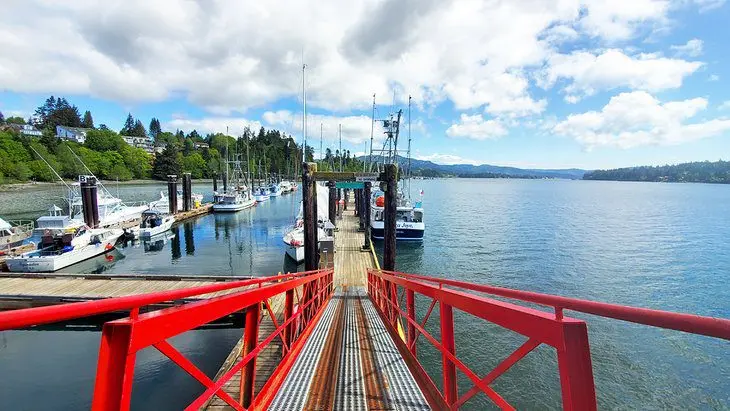
Sooke has a long maritime history, and today working fishing boats still ply the offshore waters catching tuna, salmon, and other fish. Depending on the season, you’ll have a good chance of finding a fisherman selling his fresh catch direct off the boat. The Government docks are located just a short distance north past downtown off Maple Avenue.
If the boats are all out at sea during your visit, don’t despair, a bit farther along West Coast Road is another marina where you’ll find a small retail store selling the same products, albeit frozen and at higher prices. Turn down the unnamed road just past the turnoff from the Prestige Hotel. Usually, there’s a sign with a picture of a crab on it directing the way.
10. Soak Up the Views at French Beach Provincial Park
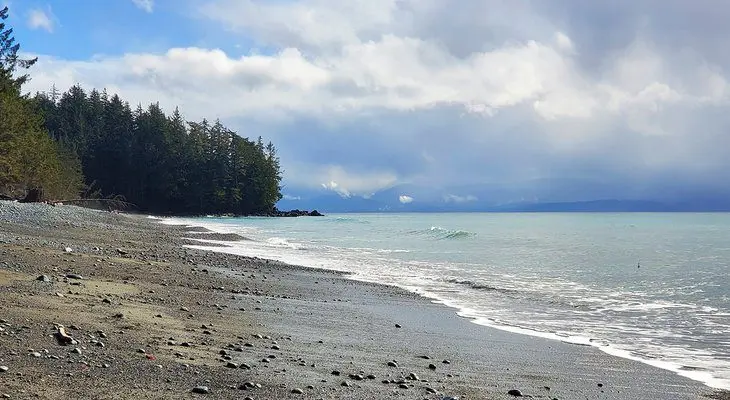
At French Beach Provincial Park a long, lonely beach backed by towering trees provides the quintessential British Columbia experience. This park, free to visit, has a wonderful green space, with picnic tables, a playground, fire pits, and informative placards on whale migration.
Views across the Juan de Fuca Strait to the Olympic Mountains are spectacular on clear days. The beach itself is 1.6 kilometers long and is best walked at low tide. If the tides are not in your favor, a walking trail runs behind the beach to the south. A forest trail with boardwalks winds its way through the wetlands behind the beach, and it’s here you’ll see large trees, and in the spring the colorful skunk cabbage, also known as swamp lanterns, bloom beside the trail.
One of Vancouver Island’s best campgrounds is located here and has recently been upgraded with new washrooms and wider access roads.
11. Catch the Big One on a Deep Sea Fishing Trip
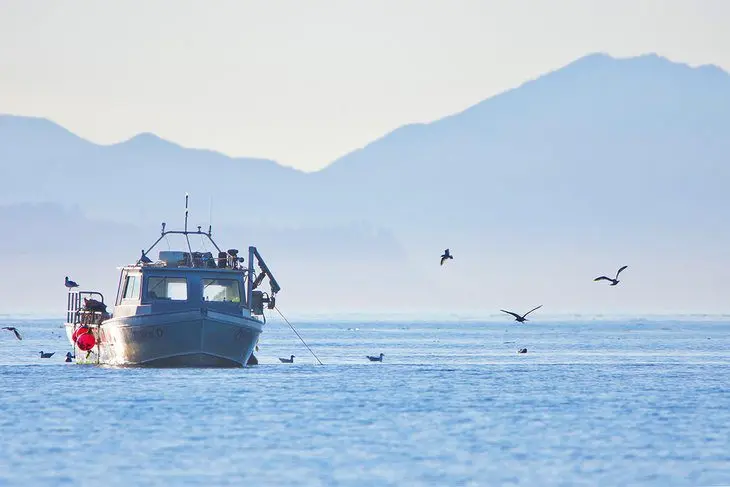
The waters off Sooke teem with fish, especially salmon. Fishing here is legendary, with trophy catches of Chinook, coho, sockeye, and pinks. Sizes range from 5 to 20 pounds. In the summer, the Chinook get up to nearly 50 pounds! Also available to catch from March to May are halibut.
These bottom-feeding fish average around 30 pounds, but lucky anglers have occasionally caught ones over 300 pounds. The best time to catch these beasts is when the herring run, usually tied to a full moon event in March.
Fishing here is a pleasant experience and has all the advantages of deep-sea fishing without the downside. The reason it’s so great is that the protected waters of the Juan de Fuca Strait mean that large rolling waves are a rarity and, as a result, motion sickness is less of an issue. As a bonus, the views out to the Olympic Mountains on clear days are spectacular.
Several different local outfitters operate out of Sooke, and they keep their eyes and ears peeled as to where the fish are running. Charters usually leave very early in the morning, and trips are usually half or full day in duration. Demand can be high in the summer; be sure to do a bit of research and call well ahead of your planned trip.
12. Go Whale Watching
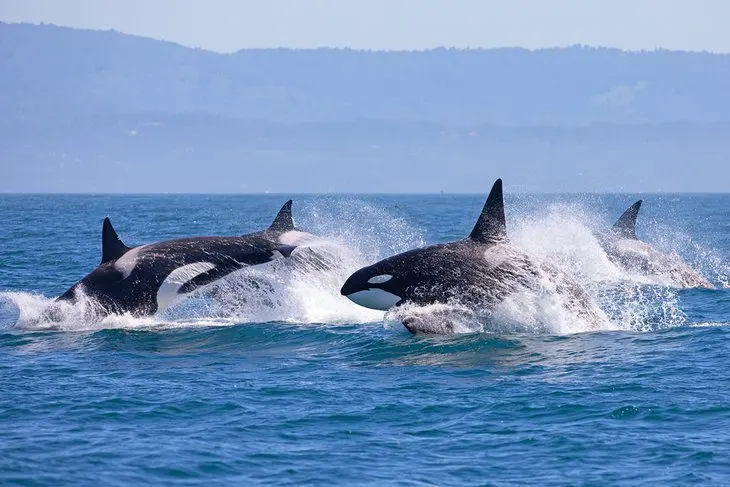
Sooke is ideally positioned as a jumping-off spot to see whales. The Juan de Fuca Strait is prime whale watching territory. Orcas as well as humpback and grey whales are all frequent visitors, especially in the spring and summer.
In addition to seeing whales, most tours take in the Race Rocks Ecological Reserve and the rugged coastline of East Sooke Regional Park. Whales are not the only animal sightings – seals, otters, sea lions, and bald eagles also make regular appearances and sometimes steal the show.
13. Visit the Old-Growth Trees in Port Renfrew
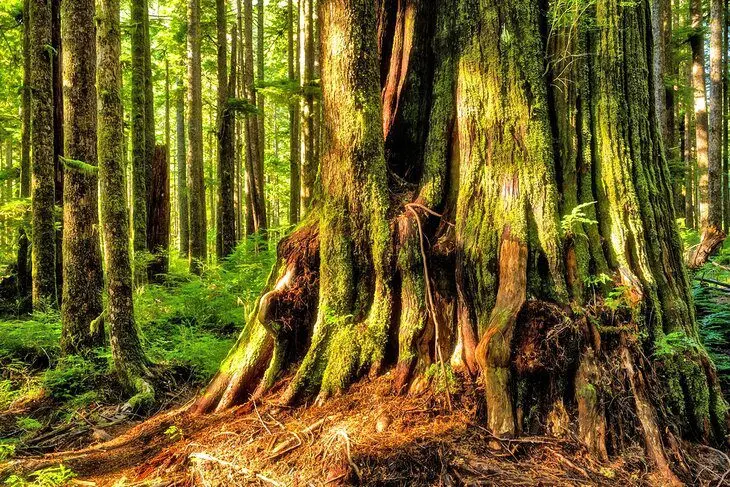
A trip to see these majestic giants should be on everyone’s to-do list when visiting Sooke. Silent sentinels to what this area of British Colombia used to look like, these amazing trees must be seen so they can be protected for future generations.
The trees, primarily Douglas fir and western red cedar, are stupendously huge, many are over 12 feet (four meters) in width at the base. They tower overhead, their tops not visible from the ground.
The most spectacular area is called Eden Grove. You’ll need a high-clearance 4WD to drive there. Or park before the road gets too rough and walk in. Along the way, you’ll pass by Big Lonely Doug, a 1,000-year-old tree standing all by itself; Eden Grove is about a kilometer past him.
Another impressive area that you’ll reach on your way to Eden Grove is Avatar Grove. This area is easier to get to and has two trails with stairs and boardwalks that will take you past the largest trees. The upper trail will take you to a very unique cedar nicknamed “Canada’s Gnarliest Tree.”
Count on a full day to drive to and from Port Renfrew along with time to explore the trees. A map of the area shows how to get to both of these places.









